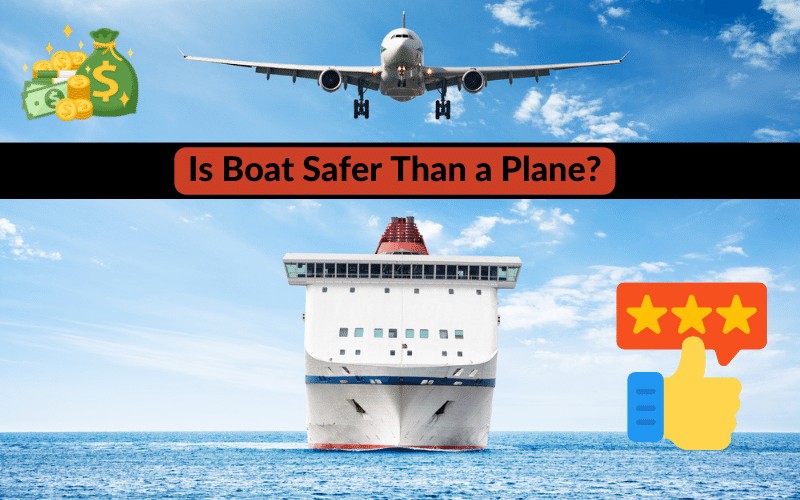Is Boat Safer Than a Plane? The safety of boats versus planes depends on various factors, such as the type of boat or plane, weather conditions, and the experience of the pilot or boat operator.
In general, commercial aviation is considered to be one of the safest forms of transportation in the world.
Commercial airlines are subject to rigorous safety standards and regulations, and the pilots undergo extensive training and are required to have thousands of flight hours before they can operate a commercial plane.
Moreover, modern planes are equipped with sophisticated technology and safety features that minimize the risk of accidents.
On the other hand, boats can also be safe if operated correctly and in favorable conditions. However, unlike planes, boats are not subject to the same level of regulation and safety standards.
There are various types of boats, and some are inherently riskier than others. For example, recreational boats like jet skis and speedboats can be dangerous if not operated safely or if the operator is inexperienced.
Overall, both boats and planes can be safe if operated correctly and in favorable conditions. However, commercial aviation is generally considered to be safer due to the extensive safety of boat regulations and technology used in modern planes.
Which Is More Expensive Ship or Plane?
The cost of ships and planes can vary greatly depending on various factors such as the type of vessel or aircraft, size, features, and purpose. In general, commercial airplanes tend to be more expensive than ships.
For instance, a large commercial aircraft such as a Boeing 747 can cost hundreds of millions of dollars to purchase, while a typical cargo ship or container ship can range from tens of millions to a few hundred million dollars.
However, the cost of owning and operating a ship over its lifetime can be significantly higher than that of an aircraft due to factors such as fuel consumption, maintenance, and crew costs.
Furthermore, the cost of air travel for passengers is generally higher than that of sea travel, especially for long distances. This is due to the faster speed and convenience of air travel, which makes it more expensive.
It’s worth noting that the cost of ships and planes can vary widely depending on the specific type, usage, and other factors. Therefore, it is not accurate to generalize that one is universally more expensive than the other.
Is Airplane Faster Than Ship?
In general, airplanes are faster than ships. A commercial airplane can travel at speeds of around 500 to 600 miles per hour, while a typical cargo ship or container ship may travel at speeds of around 20 to 25 miles per hour.
Airplanes are able to travel faster because they fly through the air, which has less resistance than water. Additionally, airplanes have powerful engines that allow them to reach high speeds quickly and maintain them for extended periods of time.
On the other hand, ships are designed to be efficient rather than fast, and they rely on the power of their engines to push through the water. Ships can also be affected by weather conditions and ocean currents, which can slow down their speed.
It’s important to note that the speed of a ship or airplane can vary greatly depending on various factors such as the specific type of vessel or aircraft, weather conditions, and the distance of the journey.
For shorter distances, a ship may be faster due to the time required for passengers to board and disembark from an airplane, while for longer distances, airplanes are generally faster and more efficient.
Which Mode of Transportation Is the Safest?
In general, the safest mode of transportation is air travel, followed by rail travel and then road travel.
According to statistics from the National Safety Council, the odds of dying as a passenger on a commercial airplane are 1 in 205,552, while the odds of dying in a car crash are 1 in 107. Meanwhile, the odds of dying in a train accident are even lower, at 1 in 178,741.
It’s important to note that safety can vary greatly depending on the specific circumstances and the precautions taken.
For example, flying during severe weather or in an older aircraft can increase the risk of accidents, while driving while under the influence of drugs or alcohol is a major cause of car crashes.
Overall, it’s important to prioritize safety when traveling and take steps to minimize risks, such as wearing seatbelts, following traffic laws, and choosing reputable airlines and transportation providers.
What Is Safer Airplane or Cruise Ship?
In general, airplane travel is considered to be safer than cruise ship travel. The safety record of commercial aviation is excellent, with a very low rate of accidents and fatalities per passenger mile.
According to statistics from the National Transportation Safety Board (NTSB), the fatality rate for commercial airline travel in the United States is 0.017 per 100 million miles traveled, while the fatality rate for cruise ship travel is 0.15 per 100 million miles traveled.
This means that, on average, cruise ship travel is about nine times more likely to result in a fatality than air travel.
However, it’s important to note that safety can vary greatly depending on the specific circumstances of the flight or cruise. Both forms of travel are heavily regulated and subject to strict safety standards and protocols, and accidents can happen in any mode of transportation.
When choosing a mode of transportation, it’s important to consider factors such as the length and purpose of the trip, the availability of alternative options, and personal preferences and comfort levels.
Regardless of the mode of transportation chosen, it’s always a good idea to prioritize safety and take necessary precautions.

